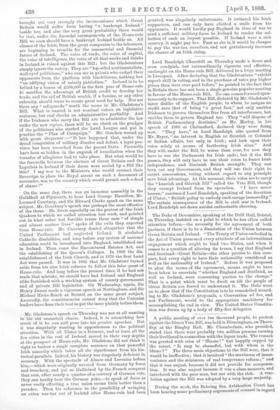Mr. Gladstone's speech on Thursday was not at all wanting
in his old oratorical charm. Indeed, it is astonishing how much of it he can still pour into his greater speeches. But it was singularly wanting in appositeness to the political situation. With all Ulster in a ferment, and at least all the few cities in the rest of Ireland moved to their very depths at the prospect of Home-rule, Mr. Gladstone did not think it right to bestow a single complete sentence on that powerful Irish minority which takes all the significance from his his- torical parallels. Indeed, his history was singularly deficient in accuracy. With the spectacle of Alsace and Lorraine before him,—which were originally wrested from Germany by force and treachery, and yet so Gallicised by the French conquest that now, after nearly a quarter-of-a-century of German rule, they can hardly bear the German yoke,—to speak of force as never really effecting a true union seems little better than a paradox. Then his reference to the possibility of wringing an extra war-tax out of Ireland after Home-rule bad been granted, was singularly unfortunate. It irritated his Irish supporters, and can only have elicited a smile from his opponents. It would hardly pay England in time of war to send a sufficient military force to Ireland to render the col- lection of such an impost possible. If Ireland were a rich country, it might pay her. Poor as she is, it would be cheaper to pay the war-tax ourselves, and not gratuitously increase the chance of an Irish rising.


































 Previous page
Previous page